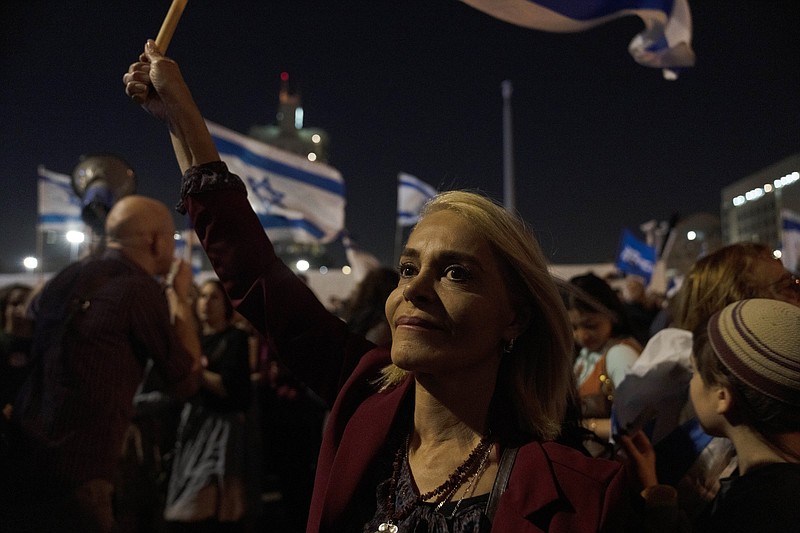TEL AVIV -- The surprise resignation of a senior lawmaker Wednesday has stripped Israel's coalition of its majority, raised the prospect of a fresh round of elections and compounded unexpected challenges to the security establishment as it grapples with an increasingly lethal rise in Israeli-Palestinian violence.
The lawmaker, Idit Silman, a member of Prime Minister Naftali Bennett's right-wing party and chairwoman of the governing coalition, said Wednesday morning that she had decided to quit the coalition after Bennett refused to back an ultimatum requiring Israeli hospitals to observe dietary restrictions during the Jewish holiday of Passover, which starts on April 15. She accused Bennett's government of "damaging Israel's Jewish character" and said she would join former prime minister Benjamin Netanyahu's Likud party, after he promised her the role of health minister if he won new elections.
"We tried unity," Silman said. "The time has come to form a national, Jewish and Zionist government. To chart a new course. Let's join hands, to be the voice for the values for which we were elected."
Amid a flurry of celebratory tweets from the right-wing opposition, Netanyahu tweeted, "I congratulate her in the name of multitudes from the Jewish people who have been yearning for this moment."
On Wednesday night, at a rally in Jerusalem, Netanyahu invited other right-wing lawmakers in the coalition to follow Silman, saying that the "weak" government was endangering Israelis, referring to a spate of terrorist attacks over the last two weeks that has killed 11 people.
"There is a simple rule," said Netanyahu. "When terrorism smells weakness, it raises its head. And when it encounters power, it bows its head."
Israel's government is held together by a slight majority and was cobbled together nine months ago by many ideologically diverse parties united by the commitment to oust Netanyahu after his 12 years in power. If no other coalition member leaves, the government could limp along with 60 seats until March, when it will need an outright majority, 61 seats, to pass a budget, experts say.
"We can clearly say that we're rolling back into political crisis mode," said Yohanan Plesner, the president of the Israel Democracy Institute. "But this crisis could continue for many months up to an actual year."
In the meantime, the coalition will recruit possible replacement support from the Joint List, an alliance of mostly Arab parties, or from Haredi, or ultra-Orthodox, parties, which have been loyal to Netanyahu. But the prospect of new elections will make it even less likely other parties will make ideological compromises to join the government, as they focus on keeping their core political supporters happy, Plesner said.
In recent weeks, Israel again began grappling with a wave of terrorist attacks carried out by Palestinians from the West Bank and from Israel. The attacks have left 11 people dead and prompted Bennett to declare a "murderous wave of Arab terror" -- using the word "Arab" rather than "Palestinian," as is common among his supporters, some of whom deny the existence of a Palestinian people.
In response to the heightened security situation, Bennett has called on citizens with gun permits to carry arms to reinforce the scaled-up security forces dispersed throughout Israel and the West Bank. But he has also tacitly allowed the Defense Ministry for the first time since 2007 to issue 20,000 work permits for the Gaza Strip, allow family visits for Palestinian prisoners, issue permits for traders in Gaza, and lift many other restrictions.
The economic measures -- part of a strategy the government has referred to as "shrinking the conflict" -- have also prompted criticism of Bennett as pursuing half measures rather than tackling grievances at the core of the Israeli-Palestinian conflict. Those grievances include the "overall dynamics of occupation, institutionalised discrimination or denial of basic rights," the International Crisis Group wrote in an analysis published last week.
"These things don't stop the occupation, but they give quality to the day-to-day life," said retired Col. Miri Eisin, a former senior intelligence officer in the Israeli military, referring to Israel's military occupation of the West Bank. "There are still all the challenges of a disenfranchised Palestinian youth, which was made worse during the last two years of covid, when high-schoolers and university didn't have any kind of structure. But the hope is that they will not be angry enough to carry out an attack."
Information for this article was contributed by Hazem Balousha and Sufian Taha of The Washington Post.
